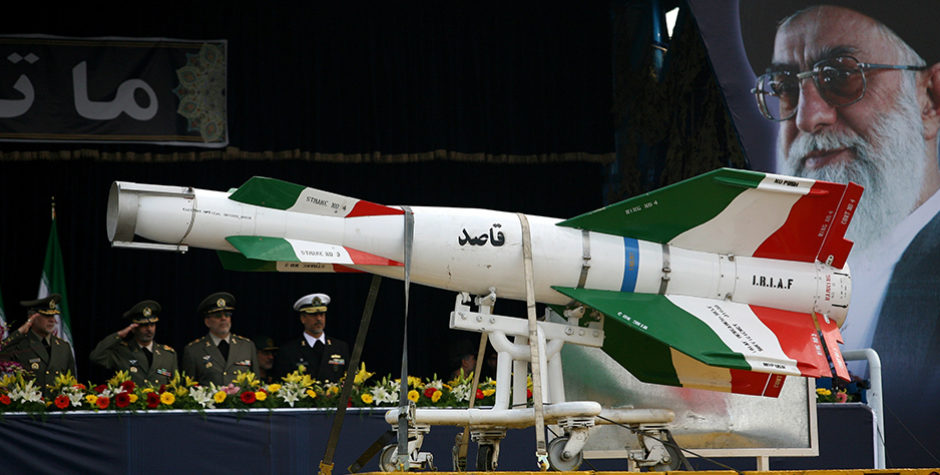Renewed U.S. Sanctions on Iran: Why They Are Important
On Monday the Trump Administration issued new sanctions on Iran, including sanctions against over two dozen people and other groups involved in Tehran’s nuclear program, ballistic missile tests, and the buying and selling of conventional weapons to the rogue nation, the world’s largest state sponsor of terrorism. The sanctions were imposed under an executive order from President Trump. The importance of these sanctions cannot be overstated. They potentially target any individual, company, or nation that attempts to assist Iran in its weapons programs.
United Nations’ sanctions are set to expire next month, and it is questionable that they will be renewed. President Trump stated, “My administration will never allow Iran to endanger the rest of the world with a fresh supply of ballistic missiles and conventional arms.” And the danger of Iran is very real. Iran has repeatedly violated the terms of the JCPOA (Iran Nuclear Deal) after the U.S. withdrew from the accord, even though the agreement is supposed to be in force as other nations are still in the agreement. It continued its enrichment of uranium unabated.
However, the JCPOA was a farce from the beginning. For example, it never allowed U.N. inspectors to visit any Iranian military bases, even though those are the presumptive locations of Iran’s nuclear program. Iran continues to violate the U.N. prohibition of testing missiles, and Iran continues to export weapons and technology to terror groups around the world. This exporting of terror was expanded when the previous Administration delivered pallets of cash to Iran and released Iran from its international economic restrictions, including the sale of oil.
Already the sanctions that are in place have crippled Iran’s economy. This has decreased its support of terror groups but did not halt Iran’s weapons programs. Meanwhile, Iran continues to oppress its own people. Thousands of its citizens were jailed for demonstrating against corruption and the financial hardships, hardships exacerbated by Iran sending millions of dollars to terror groups like Hamas and Hezbollah. Iran has restricted its people’s access to the outside world via the internet and news media. They have shot students who demonstrated in the streets. Tehran has supported Syria’s President Assad as he butchered Syrians, with over 500,000 dead in the civil war there. It has threatened international shipping lanes in the Middle East and struck oil tankers with explosives. Iran attempted to assassinate the Saudi Arabian ambassador to the United States in Washington, D.C. Numerous citizens from other nations have been jailed under specious charges and continue to be held there. Iran is behind numerous cyberattacks on Israel, the United States, and its allies in the region.
Iran is the chief threat to the Arab Gulf States. Ironically, as Iran has sown instability to these nations and used subversive activities to attempt to overthrow the ruling powers there, it has inadvertently helped the peace process in the Middle East. It has become apparent that Israel is not a threat to the Muslim-majority nations there; Iran is the threat. This is why the United Arab Emirates and Bahrain signed the Abraham Accords with Israel. More nations in the region are expected to do likewise. Their national security and peace in that part of the world is in the balance, and they know it.
Presidential candidate Joe Biden has criticized the Trump Administration’s policies on Iran. If elected, he has promised to re-enter the JCPOA, a promise he seriously needs to rethink. Even as this is happening, Iran’s Foreign Minister Mohammed Zarif has stated that the only way Iran would agree to the U.S. being a part of the nuclear deal would be for the U.S. to do two things: Reimburse Iran to the tune of millions of dollars for the financial losses brought about by U.S. sanctions; and to promise that the U.S. will not enlarge any of the prohibitions on Iran’s weapons programs. In short, Iran continues its duplicity and its attempts to extort the United States. This is indicative of Iran’s malign intentions and its lack of seriousness on the issues addressed in the failing JCPOA.
We live in a dangerous world, made all the more dangerous by bad actors like Iran, North Korea, and Venezuela, among others. They not only seek violence on their perceived enemies, they also target and abuse their own citizens who dare to stand up to them and call for justice and reform. Does anyone believe that Iran’s intentions and goals are peaceful? Does anyone believe that Iran would not use a nuclear device, or other weapon of mass destruction, on the United States if they could covertly pull off such an operation? The chief responsibility of the President of the United States is national security. Keeping the American people safe, at home and around the world, is the most important task of any administration. The sanctions on a nation like Iran, a sworn enemy who views our country as the Great Satan, are vital to our safety and the safety of people literally around the world.
